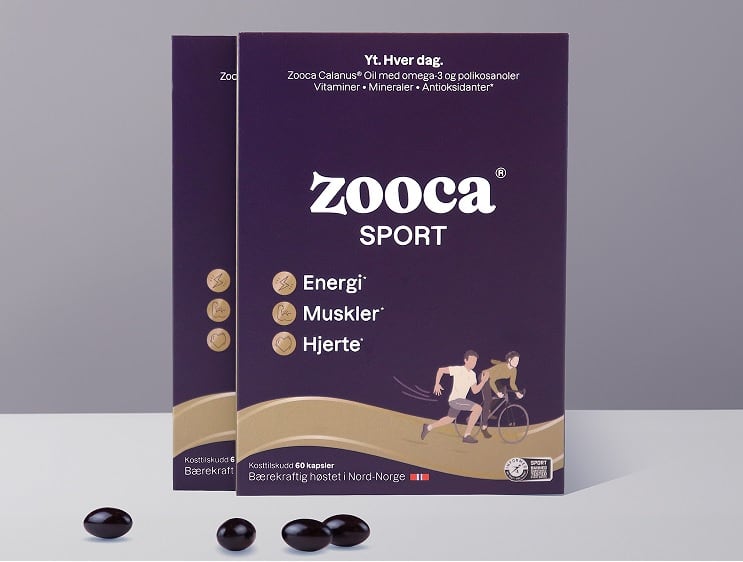After launching its first products D2C in Norway in 2016, rolling out on a B2B basis in Europe and the US, and opening the world’s first purpose-built copepod facility in 2021, the company is extending its "ultra-sustainable" omega-3 sourced from microscopic zooplankton Calanus finmarchicus.
Marianne Mæhlum, Zooca's chief marketing and innovation officer, told NutraIngredients that the sport variant, now available across Europe and the U.S., was a natural progression after their scientific research revealed sport-focused benefits.
A study published in 2022 concluded that Calanus oil supplementation during a four month exercise training intervention in 55 elderly women improved maximum cardiac function (8%, measured by spiroergometry and PhysioFlow hemodynamic testing), insulin sensitivity (12.5%, measured by Hyperinsulinemic-euglycemic Clamp) and muscle strength (25%, according to arm curl and chair stand tests).
"When we put all those benefits together, we saw this has a positive impact on a lot of factors that are important for people that are looking to improve their physical sports performance," Mæhlum said.
In addition to EPA and DHA, the product contains a “full spectrum” of 40 different fatty acids, marine policosanols, zinc, and vitamins B5 and B6 to support energy levels, as well as vitamin D3, magnesium and astaxanthin to support muscle and bone structure.
Calanus finmarchicus
Calanus finmarchicus is a species of copepod and a component of zooplankton, which is found in enormous amounts in the northern Atlantic Ocean. It has a life cycle of up to 1.5 years which ensures stable and fast reproduction.
Reproduction in the Norwegian Sea is estimated to be almost 300 million tonnes a year. The annual commercial quotas are set to 250.000 tonnes, less than 0,1% of the annual volume, and Zooca has a current production capacity of 15.000 tonnes, less 0,005% of the annual reproduction volumes.
Improving the product’s sustainability credentials further, processing of the ingredient involves zero product waste, meaning the entire organism is used.
Mæhlum explained that Zooca uses mild heating to create the extract, and this minimal processing means the product retains its natural broad spectrum of beneficial compounds, Mæhlum explained.
“We think the health results are a result of synergistic effects of ingredients and whole chemical composition, which makes it unique compared with pure refined fish oil.”
Mæhlum added that because the extract uniquely comes in a wax ester form it provides a longer and gradual absorption further down the digestive system thereby improving bioavailability.
What's more, because zooplankton only live for around a year, they do not have enough time to build up a content of pollutants or heavy metals.
Glucose and insulin control
In a study published in 2022, scientists from Leibniz University Hannover and Hannover Medical School reported that 12 weeks of Zooca supplements led to significant reductions in fasting plasma insulin and HOMA-IR in obese people.
The researchers recruited 43 obese people to participate in a randomized, placebo-controlled, double-blind study. Participants were randomly assigned to receive either 2 g per day of calanus oil (Zooca/ Calanus AS) or a placebo for 12 weeks.
Data showed that the calanus oil group experienced significant improvements in a range of biomarkers compared to placebo. Specifically, fasting insulin, HOMA-IR and HIRI significantly improved after 12 weeks of calanus oil supplementation.


